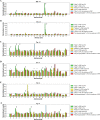Profiling the Human Phosphoproteome to Estimate the True Extent of Protein Phosphorylation
- PMID: 35532924
- PMCID: PMC9171898
- DOI: 10.1021/acs.jproteome.2c00131
Profiling the Human Phosphoproteome to Estimate the True Extent of Protein Phosphorylation
Abstract
Public phosphorylation databases such as PhosphoSitePlus (PSP) and PeptideAtlas (PA) compile results from published papers or openly available mass spectrometry (MS) data. However, there is no database-level control for false discovery of sites, likely leading to the overestimation of true phosphosites. By profiling the human phosphoproteome, we estimate the false discovery rate (FDR) of phosphosites and predict a more realistic count of true identifications. We rank sites into phosphorylation likelihood sets and analyze them in terms of conservation across 100 species, sequence properties, and functional annotations. We demonstrate significant differences between the sets and develop a method for independent phosphosite FDR estimation. Remarkably, we report estimated FDRs of 84, 98, and 82% within sets of phosphoserine (pSer), phosphothreonine (pThr), and phosphotyrosine (pTyr) sites, respectively, that are supported by only a single piece of identification evidence─the majority of sites in PSP. We estimate that around 62 000 Ser, 8000 Thr, and 12 000 Tyr phosphosites in the human proteome are likely to be true, which is lower than most published estimates. Furthermore, our analysis estimates that 86 000 Ser, 50 000 Thr, and 26 000 Tyr phosphosites are likely false-positive identifications, highlighting the significant potential of false-positive data to be present in phosphorylation databases.
Keywords: PeptideAtlas; PhosphoSitePlus; UniProt; database; evolutionary conservation; false discovery rate; mass spectrometry; phosphopeptides; phosphoproteomics; phosphorylation; phosphosites; proteome; proteomics.
Conflict of interest statement
The authors declare no competing financial interest.
Figures







References
Publication types
MeSH terms
Substances
Grants and funding
- C1443/A22095/CRUK_/Cancer Research UK/United Kingdom
- R24 GM127667/GM/NIGMS NIH HHS/United States
- BB/M012557/1/BB_/Biotechnology and Biological Sciences Research Council/United Kingdom
- BB/S018514/1/BB_/Biotechnology and Biological Sciences Research Council/United Kingdom
- BB/R000182/1/BB_/Biotechnology and Biological Sciences Research Council/United Kingdom
LinkOut - more resources
Full Text Sources
Research Materials
Miscellaneous

